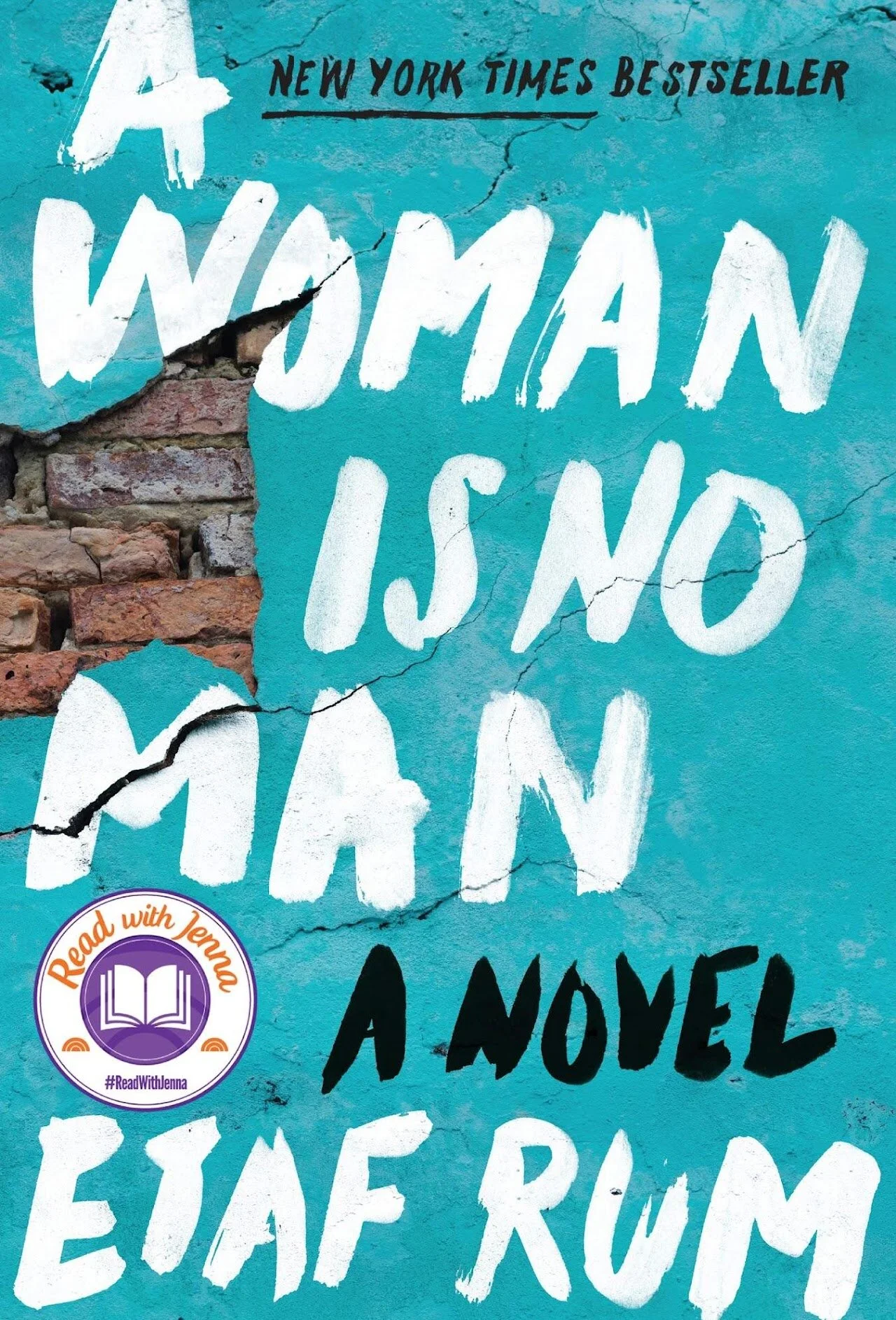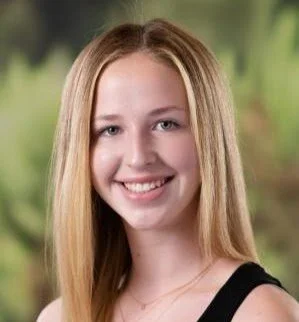
A Woman is No Man
By Etaf Rum
A Woman is No Man
-
A Woman is No Man is the debut book of 32-year old author Etaf Rum, an Arab-American novelist. The book was released in 2019 and received the honor of being included in the 2020 Amelia Bloomer Book List. The list is compiled by a committee that includes the Feminist Task Force of the Social Responsibilities Round Table, and it is intended for young readers. Rum grew up in Brooklyn, but her parents were raised in Palestinian refugee camps. Rum’s mixed Palestinian and Brooklyn identity mirrors the lives of her novel’s two protagonists, Isra and Deya. Rum’s parents and grandparents restricted her freedoms at a very early age, saying she shouldn’t pursue an education because she “wasn’t a man.” Rum was raised in a family that followed traditional Palestinian values, so she was married off to a suitor as a teenager. Soon thereafter, she gave birth to a daughter at 19 and a son at 21, but struggled to raise them while also getting her degree from North Carolina State. Her protagonist Isra also has difficulty raising children as a teenage mother. Rum now teaches undergraduate writing courses in North Carolina and works on her writing career. She says that she wrote A Woman is No Man with the intent to expose the almost non-existent female Arab-American perspective in literature.
-
In Palestine in 1990, Isra’s family marries her off to an American-Palestinian, and she hopes to discover a newfound feminist freedom in Brooklyn, New York. Her American Dream is disrupted when she instead is trapped under the scrutinizing gaze of her abusive husband and oppressive mother-in-law. As she fulfills the responsibilities of a Palestinian wife and mother, Isra longs to find the love she reads so much about.
In Brooklyn nearly 20 years later, Isra’s daughter Deya meets with potential suitors under the instruction of her strict grandmother. Deya yearns to go to college before marrying and to create a life for herself as an independent woman. Books are her escape from the cyclic reality she lives in; like Isra, she reads tender love stories, yet her loneliness prevents her from believing in it. Deya’s sisters are her only companions, yet even they would never understand Deya’s isolation as they all lack the unpleasant memories of their distant parents and abusive father. As Deya uncovers appalling information about her parents, she questions the traditions she is upholding and discovers an internal courage that inspires her to resist and break free from the cycle of arranged marriage and family duty.
-
Each of these characters’ stories is connected through parallel experiences which illustrate the shift in perspective between generations, specifically regarding tradition. For Fareeda, Palestinian-woman and stern mother-grandmother, tradition means that her daughters, regardless of the bad luck and effort it takes to raise them, must live a devoted life of obedience and housework. Domestic chores busy an “Arab” girl’s time before she is married off to a life of similar duties, now including a woman’s “true purpose” of child rearing. Their tradition, according to Fareeda, excludes the freedom of an American: walking alone, attending college, or even reading of the love and individuality promised by the American Dream. And although the Quran mandates salat and forbids haram, Fareeda cares more about Arab tradition as it pertains to a wife and mother, than Arab tradition as it pertains to the Quran. But Fareeda’s daughter Sarah, daughter-in-law Isra, and grand-daughters, especially Deya, define “tradition” differently than Fareeda. These daughters bear Fareeda’s idea of tradition with less significance, almost in ascending order according to their ages. Isra, oldest besides Fareeda, maintains an image of traditional womanhood more like Fareeda’s than Deya’s, staying silent as her husband beats her. Isra’s daughter Deya remains determined to attend college prior to marriage, yet she still accepts this obligation as a Palestinian descendant. Despite the variety in acceptance of these repressive Arab traditions, they all display at least some level of resentment.
Fareeda blames her family’s move to the United States for the girls’ tainted versions of her tradition. When they breach Fareeda’s idea of tradition by reading and refusing to marry a suitor, Fareeda blames that they don’t live in Palestine anymore, directly suggesting that Palestinians in Palestine can be more rigid with their parenting style; they can get away with more harsh disciplining. Isra, who was born in Palestine, confirms this notion: she registers how she could never talk back to her parents like Sarah does to Fareeda, especially during her first months in Brooklyn. She also acknowledges that there weren’t police or any internal motivation to “save” her, as American-born Sarah suggests she do after her husband, Adam, beats her. Confirmed by Isra’s understanding of childhood discipline in Palestine, Fareeda admits how life in America made her unruly when she discusses how a Palestinian girl would understand the “way things are.”—Rum’s Palestinian girls understand the unchanging, repetitve, yet important, cycle of cooking, cleaning, perfect chai-brewing, and raising children.
Argued by historian Thomas S. Frank, personal freedom can often be interpreted as a western value. Under this argument, logically, the girls’ desires to make their own choices regarding their love lives, postgraduate education, and income, might too come from their experiences growing up in Brooklyn, New York, not a town in Palestine. Living in a western country, it's clear that personal freedom, especially for women, and especially because the girls read so much, is crucial to their happiness but also a key part of how they disturb Fareeda’s idea of tradition.
Fareeda’s obsession with tradition is partially due to her belief that a jinn—an evil spirit—has been haunting her ever since her twins died as infants when she fed them goat’s milk instead of breast milk. Traditional Muslims believe the jinn can haunt someone for disobeying the Quran or ignoring familial or communal responsibility. Similarly, in The Brief Wondrous Life of Oscar Wao by Junot Diaz, the Dominicans believe the fuku—a sort of “doom”—can curse someone for any small act that suggests they do not respect the dictator Trujillo. This type of ideology confines people in traditional ways, whether they would consider those ways to be right or wrong. Fareeda and Khaled, afraid to in any way offend their son and be disgraceful Palestinian parents, neglect to support Isra throughout her abuse. They erase their daughter from their lives out of a fear of reputation and an anger at the curse that she might have cast upon them by running away. Fareeda blames all of her actions and assumptions on the jinn. By upholding these traditional views, people fail to see what is Right. They wear a mask over their head, and the eyeholes are cut out to display only the past. When one’s purpose is to be what their ancestors have been, change is impossible, even if change is Right.
-
How does the author’s personal experience with arranged marriages impact her portrayal of the protagonists as being in arranged marriages?
How do Deya’s experiences with men compare to Isra’s? What is the most distinguishing difference?
How are 1st and 2nd generation immigrants represented differently in the novel?
Why do so many women stay quiet about the abuse they experience? How do we see characters follow or defy this norm?
In what ways does Deya reading books about love impact her personal relationships? How do the men in the novel react to the women reading/learning?
How does women’s education intersect with their familial obligations? Why is there so much backlash to trying to redefine their roles?
In addition to programs like MBest, how can we at Menlo continue to increase opportunities for and in support of women’s education?
In what ways would the portrayal of Deya and Isra be considered a single story? In what ways would they not?
What is Fareeda’s stance towards preserving culture? What is Isra’s? Deya’s?
Why are men forgiven for violence or other acts that go against the Quran, whereas women are typically not? Consider Fareeda’s and Khaled’s reactions to Adam’s versus Sarah’s sins.
Why is Isra shamed for only having daughters and no sons? How can we change this negative stigma?
This guide deftly brought to you by….
Rishi Jain (‘22)
Hi, I'm Rishi. I love to lift and play tennis. I really enjoyed this novel and how the author eloquently elaborated on the dual story of the two protagonists.
Ryan Schaefer (‘22)
I'm Ryan Schaefer. I love sports and was on the varsity basketball and golf teams. A Woman is No Man made me angry about the inequality we see with immigrants and women, but it motivated me to continue researching solutions to the complex issues.
Lo Cioffi (‘22)
Hi! I'm Lo. I have a little dog named Sumi. A Woman Is No Man is unique because of its various perspectives: there are over four characters in the plot each in their own voice, experience, and character.
Francesca Prescott (‘22)
I love soccer, and I am on a club and school team. I do cook a lot of meals for volunteering, another one of my interests; I try to combine volunteering with my interests to make it more engaging and meaningful. I also love movies in almost any genre, but my comfort movies are all 2000s chick flicks




